#and deconstructing all hierarchies
Text

Queerplatonic does not mean and has never meant "more than friends". Reducing qprs to "non-romantic and non-sexual relation that is more than friends" is not accurate at all of the wide variety of relationships that might be qprs. For one, qprs can contain elements of romance and/or sex as much as the people in a give qpr are comfortable with. For another, "more than friends" just shows that you haven't done any work to deconstruct amatonormativity. Weaving a relationship hierarchy into the general definition of any type of relationship is amatonormative. This doesn't mean you can't value your own personal relationship as "more than friends", it is general statements about the inherent values of different relationships that is the issue.
#undescribed#queerplatonic#qpr#queerplatonic relationship#aro#aromantic#arospec#actually aro#aspec#queer#relationships#amatonormativity#panda's post
4K notes
·
View notes
Text
being in aroace education mode has me all fired up...... one thing i talk about a lot when given the opportunity is Deconstructing How We Think About Relationships - in short, if we put all of our relationships with other people into a pie chart the 'romantic partner' slice is likely to be a very small slice but gets a disproportionate amount of Relationship Infrastructure compared to other categories, such as vocabulary, rituals, attention and narrative scaffolding - entire systems such as dating / finding "the one" / break-ups / the relationship escalator, etc. on the flipside, 'friend' is such a vast category consisting of a plethora of different relationship, all ranging from Friendly Acquantaince to Extremely Close Childhood Friend You Share Everything With, but we have a lot less language and structure for how we think about these relationships even though many of them can be deeply important and intense to us.
the line between romance and friendship is really blurry, maybe even non-existent, but it feels like the way we think about these categories is that Romantic Partner is this one very specific, formalised box of a category, while Friend is a vast and vague landscape where anything can happen - and it's on this free real estate we have built structures like Queerplatonic Partner. the concept has probably existed since forever, along with many other different types of relationships throughout time and cultures, but it's our current attempt at having a Word for it.
are you with me so far? i want to write a blog post about Deconstructing Intimacy.
just putting a CW here that i'm going to say the word sex a lot and touch on the topic of sexual trauma.
one of the very thorny things about This Whole Topic is that sex and sexuality is extremely political. we just do not live in a world where there's any neutral ground to stand on regarding sex. every demographic comes with a lot of assumptions and expectations and moral judgement tied to sexuality. some demographics are desexualised, some are hypersexualised, some are Both At Once, and in addition to that there's lots of stigma, moralizing, pathologizing, and lawmaking. just a whole mess.
so all of That makes it kind of impossible to fully Dethrone Sex. and by dethroning sex i mean stripping it of the baggage it's accumulated in our cultures. Sex Is A Thing You Can Do With Your Body (And Your Mind?). this does not have to make it any less or more meaningful to you than what it already is. what each person considers intimate is very individual. many people find hugging completely inconsequential and will hug anyone at any time, and for some people a hug is A Lot. For some people, sex is a very fun and casual activity, and for others it's Sacred and carries a lot of meaning and a very close bond. sex is intimate - it requires trust and vulnerability.
it is not the only way to achieve trust and closeness, nor the only thing that requires it.
whenever i take the bus somewhere, i trust the bus driver to take me there safely. i put my literal life in a stranger's hands, but it's a very casual affair i don't think about too much. it's not an act of intimacy, just someone doing their job.
i think the way we talk about sexual assault as the evillest most horribly irredeemably worse-than-death thing, and sexual trauma as a unique kind of trauma amongst traumas, is... indicative. and please do not get me wrong, SA is a horrible thing in every way. it's a violation of trust, vulnerability and personal space. it's an abuse of power. those are the things that make it so horrific - but it's not unique.
an abuse of power, a violation of trust and vulnerability, can happen in so many different forms. emotional abuse, non-sexual violence, medical abuse, et cetera - i don't think it's possible to place trauma into a hierarchy from least to most bad. trauma can be incredibly complex and it's different for everyone. if one day the bus driver on a whim decided to drive off a cliff, i think that would severely fuck up my ability to trust other people to drive me around. if i trusted someone with my innermost thoughts that i have never shared with anyone else, and they used them to be cruel to me, that would severely impede my ability to connect with others.
i just... don't think it does anyone any favours to separate sexual trauma from all other trauma - making it seem like sexual trauma is The Worst Trauma Possible You Can Never Heal From, and on the flipside, make it seem like Well Your Non-Sexual Trauma Cannot Possibly Be That Bad.
TRAUMA TOPIC ASIDE, i think the concept of intimacy has a tendency to get flattened into just the one kind. there are many, Many ways for people to be intimate, many activities that require some form of mutual vulnerability or physical contact, but it seems like we're just very used to placing Acts of Intimacy into the Sexual category. kind of like a venn diagram where the two circles are Sexual Intimacy and Non-sexual Intimacy that are largely overlapping. but what if, instead, it's more that Intimacy is a really big circle, and sex is just one of the circles within it?
the way i think this slots into the whole Relationship Infrastructure thing is that We Like To Categorize Things. if we see two people being very intimate in a way that's not explicitly sexual, it's tempting to think ah yes they are in love AND they're having sex, OBVIOUSLY, because they are clearly capable of having that level of trust and vulnerability together. but what if they're not? does that devalue their relationship? does it make them any less close? these are very chewy questions to ask even without bringing shipping discourse into it, and i would prefer Not To because sexuality is political and there is no right answer.
another way this flattening can be frustrating is all the times non-sexual intimacy is treated as Sexual By Proxy. let's say, for example, you're telling a story, and all forms of intimacy within that story get read as metaphors for sex, despite your actual intentions. there's nothing wrong with using metaphors for sex, especially since Sex Is Political and sometimes we gotta be clever about the storytelling - but it can get very messy if people read sexuality between characters who don't have that, especially characters between which it would be very problematic to portray that. we gotta be able to tell stories about all kinds of close relationships, and surely it should be possible without bringing freud into it at every turn.
intimacy is context-dependent, i would say. a moment of vulnerability can be platonic or romantic or sexual or maybe something else depending on a situation and all the factors involved. human connection is an boundless spectrum, not just a couple boxes.
did any of this make sense? they're just my Thoughts, i'm not a scholar on this i just
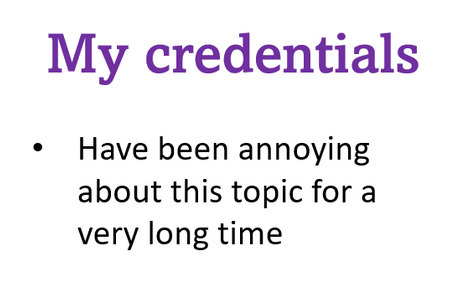
#too long for twitter#aro ace tag#asexuality#aromantic#and look. i too am a proponent of calling things gay (complimentary) without it being Explicitly Gay in a sexuality sense.
466 notes
·
View notes
Text
Underrated element of where Jiang Cheng is re: wwx after everything is that they always had a sort of dual relationship. Two different relationship premises, superimposed on one another.
There's the one where they grew up together, as close as brothers, beating each other up and complaining and being one another's closest companions, sharing a bedroom as kids and eating at the same family dinner table, actively encouraged by Jiang Fengmian to interact as equals.
And then there's the one where Wei Wuxian was in service to Jiang Cheng's family. Not as a servant--Jiang Fengmian absolutely refused to do that, even if he couldn't adopt him. But as a disciple of Jiang Cheng's father and recipient of his charity, as Jiang Cheng's future right hand and most trusted subordinate.
It's a vertical relationship, intimate in its own way but with very strict expectations about what obligations flow in what directions; they are not identical and reciprocal as between friends and equals.
(It's my opinion that Jiang Fengmian's core deal was a deep-seated discontent with the hierarchies he was at the top of, without access to any way to actually deconstruct them or even coherently articulate his opposition. Wei Changze was his dear friend, and no one thinks that's a good enough reason for him to treat Wei Changze's son like his own, because Wei Changze was also his servant, and you can't make that circle square. That's not a way you're allowed to love.)
Jiang Cheng and Wei Wuxian were like brothers; Wei Wuxian served Jiang Cheng.
The personal relationship was always the most important one. To them, in their hearts. But it was the other one that was real, that had weight in the world.
And it's important to understand that neither can be held up as more factual than the other, even though they conflict. Both relationships existed, and had power.
So then when Jiang Cheng chose to hate Wei Wuxian and articulate his grudge against him, he chose to do it in the language of fealty. Because as far as he knew, his case there was secure, watertight, and it wouldn't expose him emotionally or politically.
And those are the terms in which he's been condemning him all this time: for abandoning the Sect, for ingratitude, for lack of loyalty.
For fuckups, too, and poor judgment, but some of that now turns out to have been justified and some of it was mostly the fault of enemies behaving badly, or even Jiang Cheng himself allowing himself to be pushed into making unworthy choices.
And it was all for his sake.
The thing, the thing in my opinion, about what Wei Wuxian did, about the core transfer and his silent self-destruction around keeping it secret, is that that is a hideous thing to have done between two people who love each other, as an act of love. Beautiful, but awful. As the man who was like a brother to him, Jiang Cheng has a great deal of standing to object to it.
But as an act of vassalage, it's basically perfect.
If Wei Wuxian were only what he formally was to Jiang Cheng, if he is interpreted through a lens of fealty and obligation, he did exactly what he should have done, and went beyond what duty actually required. And went to his death silently, allowing himself to be judged, taking all the burden on himself rather than let harm come to his lord.
Like, obviously Jiang Cheng was harmed by the part where Jin Zixuan got manslaughtered and Jiang Yanli walked into the line of fire in situations where Wei Wuxian was resorting to violence and probably shouldn't have, but those are one step removed from the core issue. In terms of Wei Wuxian's intentional choices around Jiang Cheng himself, at the times he was feeling betrayed and abandoned Wei Wuxian was in fact being impossibly, poetically loyal, an absolute cliche about it.
But only in terms of the hierarchical form of their relationship.
Which means that even though Jiang Cheng has a lot of reasons to still be mad at Wei Wuxian, his actual complaints that he's centered for thirteen years are basically wiped out by the revelation of Wei Wuxian's sacrifice.
Wei Wuxian was in fact doing the tragic hero loyal vassal thing, which very much includes being misunderstood and slandered by the world. (Chenqing as a name choice absolutely references this expectation, and the idea that Jiang Cheng specifically will never understand that Wei Wuxian was trying to help him first and foremost all along; he is not subtle.)
The debts Jiang Cheng has been spitefully calling in and considering defaulted were already long paid.
So if at this point Jiang Cheng keeps pursuing that same line of rhetorical attack, now that he knows, he'll be putting himself morally in the wrong, and he knows it. But if he pivots to something else, he'll both be signalling the shape of that secret to the entire world and looking like a prize idiot.
Which is already how he feels.
To actually address the remaining grievances between them, which are considerable, would require releasing those safe, open grudges to Wei Wuxian's face and then reclaiming him as a loved one. Which is, one could fairly say, more than anyone could expect.
Which is why Wei Wuxian told him he didn't have to.
Which leaves Jiang Cheng at something of an impasse.
#hoc est meum#jiang cheng#wei wuxian#mdzs#meta#their vertical relationship was always the secure one#the one they could put into words#the one Jiang Cheng could COUNT on#and it's gone and it's what destroyed everything between them#the other relationship could be salvaged in some form#but jiang cheng would have to WANT to#and ofc he does but does he want it enough to choose to?#when wei wuxian isn't choosing him?#and ofc wwx doesn't feel jiang cheng is his to choose#the timing of the revelation is so ironic because imo#wwx spends a lot of the book processing his grief for himself#and the life he had before#and his relationship with jiang cheng#and he let it go and accepted he could never have it back after the debacle at Lotus Pier#only for jiang cheng to be forced to reexamine everything basically immediately lmao#but like wwx is not in a place where he can meet you halfway anymore jiang wanyin#he JUST got closure#it's too soon to go cutting open scars on a man who never lets himself grieve if he can help it#because if you grieve you stop and when you stop you die
1K notes
·
View notes
Text
Usually I do a focus on positivity for different labels, but do want to do a quick shoutout for aroallos because I see so little rep and a lot of stigma. While sex aversion, esp in a community that shares a lot of members/experiences w/asexual people, is common, I do think there should be discussions around how we frame sexuality and some expressions of love in general. I see a lot of aroallos, even people close to me, express sentiments around feeling less-than or shallow for what attraction they have, and I think it's sourced from the same things that oppress all of us as a community.
It's a real shame when I can see that discrimination against aroallos comes from the love hierarchy placed on other aro labels, where some types of love [or just love in general] are placed on tiers, kinda like the hierarchy of needs, pyramid style. What that order is varies person to person, but I see sexuality often left on the bottom, as if it's fundamentally less important or more shallow, which is doubly hurtful when that's your major attraction.
Properly dismantling love focus and creating relationship anarchy doesn't JUST mean decentering love as necessary, it ALSO means dismantling the structures that frame certain types of love as dirtier or less-than. It goes both ways, from putting it on a pedestal to tearing it down, and I think if we're going to focus so much on the topic of deconstructing these ideals, aroallo perspective should be included.
To all aroallos, your attraction is your attraction. It's easier said than done to accept it, especially if people around you don't, but I hope this month is peaceful and welcoming to you. It's a struggle for everyone, but that doesn't mean your personal struggles are less than anyone else's in the community, nor does it mean you're less deserving of speaking your mind on it.
[Open for input on anything]
[Edit: a pro/shipper rbed this so making it clear I do NOT support pro/shippers. Ever. Get lost]
640 notes
·
View notes
Text
skip and loafer ch. 53
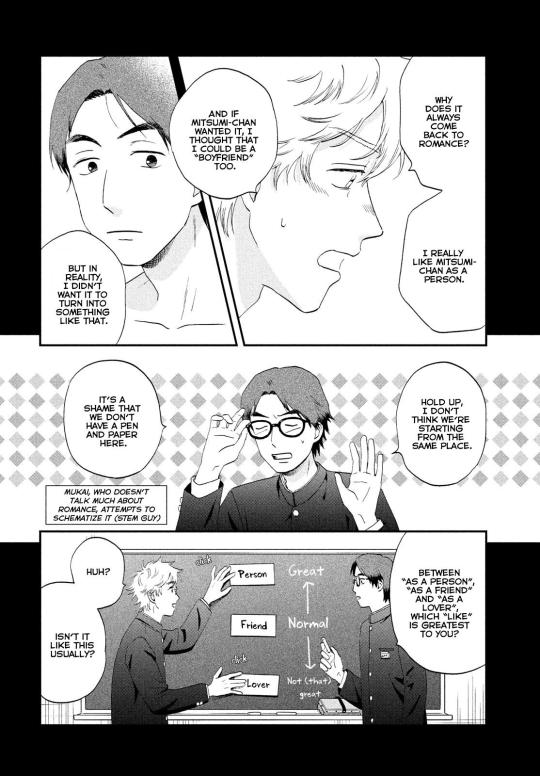
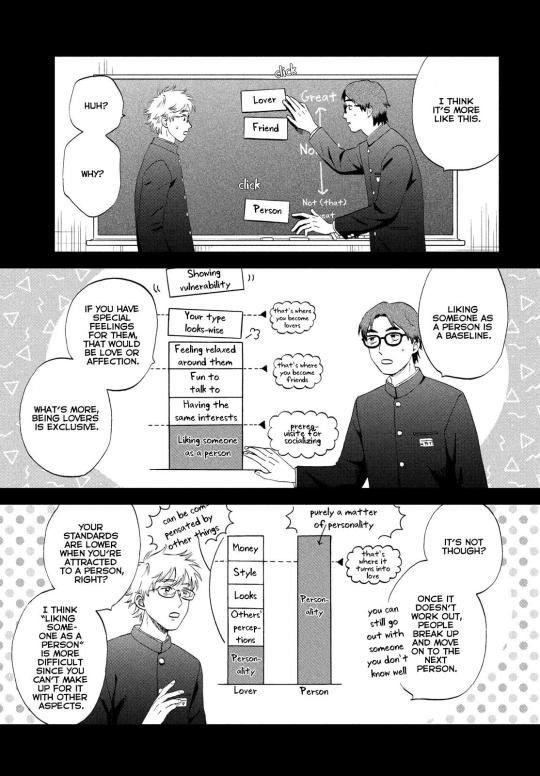
shima seems to see romantic love as a combination of different attraction factors, where liking someone as a person (for their personality) can be compensated for other things, therefore your standarts are lower when you're romantically attracted to someone. the way he sees it, the highest form of steem you can have for someone is to like them as a person, where these other factors don't matter and what you truly value is solely their personality.
i think it's interesting how mukai introduces this conversation by building a hierarchy of feelings, where romantic love stands on top of the feelings of friendship and of liking someone as a person, because that's one concept i've been personally focusing on deconstructing in my life. it's precisely by differenciating these types of feelings and putting them on a hierarchy that so many people end up in romantic relationships with people they don't really like, or why so many people drift away from their friendships when they start dating someone.
through everyone else's eyes, shima's feelings are romantic, and he doesn't feel like they are, because romance to him means something else. the lines between liking someone as a person, as a friend and as a lover are blurred. and listen, that's how they're supposed be. to love someone as a lover is supposed to mean you love them as a friend and as a person as well. a friend and a lover shouldn't be too different, and liking them as a person is supposed to be the core of both feelings.
i don't think shima is being innocent, like i've seen so many people saying on twt since the chapter came out. i think he's touching something very deep about relationships in our society that so many stories that focus on romance fail to address. in most of these stories, romance is the final goal. that's where most of them end. that's not the case here. i was already surprised when mitsumi and shima started dating, and even more surprised when they went back to being friends. that's not the usual narrative for this kind of story. because here, it doesn't seem like this hierarchy matters. and i think it's beautiful and i think it's HUGE how both shima and mitsumi value their friendship above everything else. not only them, because friendship is one of the main themes of this story. both as a dynamic and as a type of love as well.
but people have different perspectives on love and how love feels for them. it's different for mitsumi, for shima, for mika, for fumi. the way you're taught about love in your family or as a child in general has a big role on shaping that. we saw the matter of mitsumi having received lots of love in her family and childhood friends being brought up before as an explanation for her confidence. then, on the other hand, that's why we see shima acklowledging this on the next panels:
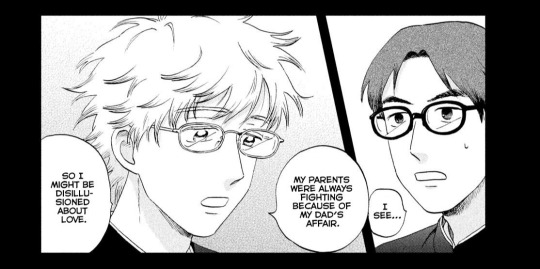
we know a few things about shima's family and their complicated relationships. shima never realized his little brother liked him because he saw his behavior as coldness or indifference, when he was actually being considerate of the distance shima was putting between them himself. he felt the need to please his mother by acting in order for her to love him, or for him to be worthy of her love, because their relationship was too anchored on exploitation. his father was having an affair, which not only made shima watch the failure of his parents marriage but also perceive romantic love as something superficial (as in "people break up and move on to the next person") and possibily as something that pushes people away. then shima's first girlfriend only liked him because of his looks, and so many others confessed to him without barely even knowing him. how could shima trust his own feelings after all of that? if he spent most of his formative years in an environment of appearences where love was tied to selfishness, interest, volatility, coldness, pain? shima learned to supress all his feelings and be a people pleaser as a survival mechanism. don't get too attached, live up to others expectations, keep your distance, smile and wave, bottle it all up. he is a kid that doesn't know a single thing about love and is scared as hell of it. love feels as if something is about to break.
that's why liking someone as a person feels more important to him. and that's not only the highest feeling he can have for someone else, i think this is the highest form of feeling he thinks someone could have for him too. it's the kind of feeling he thinks his own mother couldn't have, because acting was more important to her than who he actually was. it's the feeling he unconciously doesn't allow others to feel for him, because he never shows people who he truly is. so shima understands mitsumi's words as a love confession back in chapter 41. she didn't say "i love you", she said "that's what i love about you". and he asks her out, not only because he already knows mitsumi is different, so it seems more reasonable to give it a try, but also because he thinks this is how it's supposed to go. this is what he thinks it's expected to give her in return.
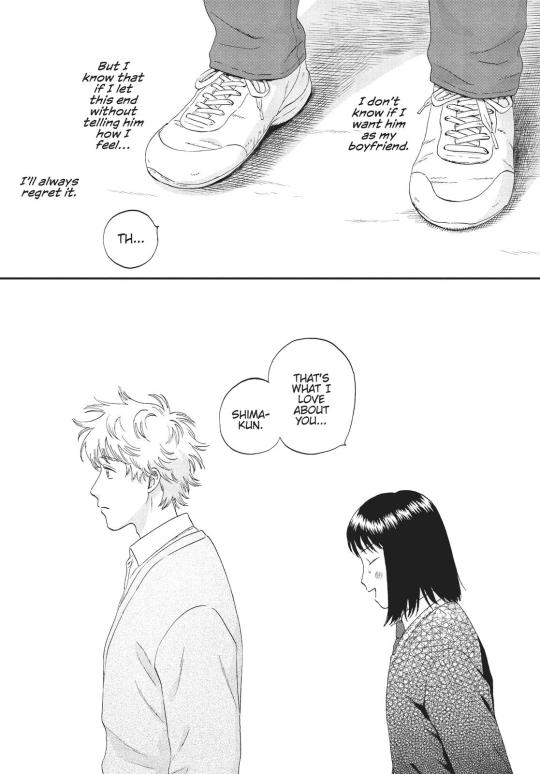
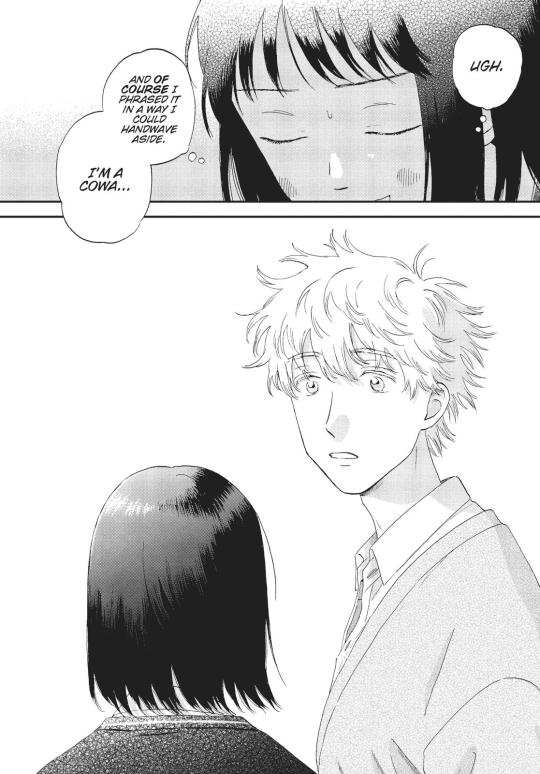
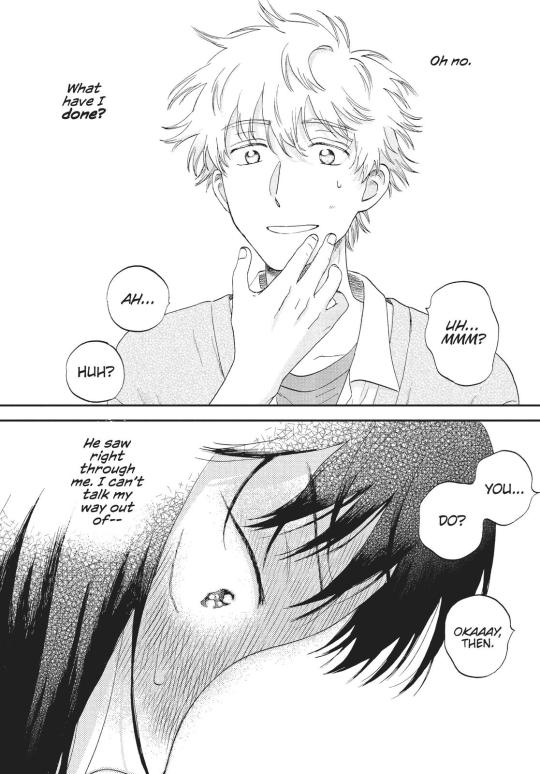
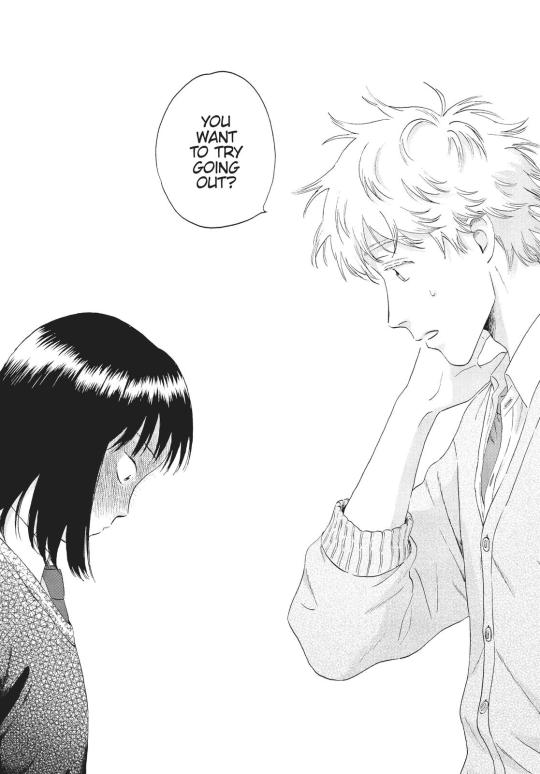
when society puts romance on the top of the relationships/feelings hierarchy, it builds an insane amount of expectations around it. i think it's crazy how friendships feel so free while romantic relationships feel so enclosured. they have too many rules. you're supposed to do this, and that, and behave in certain ways. if you start dating a friend then suddenly your friendship dynamic changes. a boyfriend or a girlfriend have responsibilities that friends don't have. it's a weight. i can't imagine a person like shima feeling any other way about a romantic relationship. for him, this is a big, big weight. that's why he puts an emphasis when he says "i thought that i could be a 'boyfriend' too". a boyfriend is a social role. when he phrases it like that, he's using the word "boyfriend" as an outside concept: he doesn't know what it means to him, he only knows what it means for everyone else. and that's not something he can do.
mukai is absolutely right when he tells shima he shouldn't be going out with anyone. shima isn't ready to be that close to anyone, not even his closest friends. i can't even describe how sad i felt when mukai said this to him:
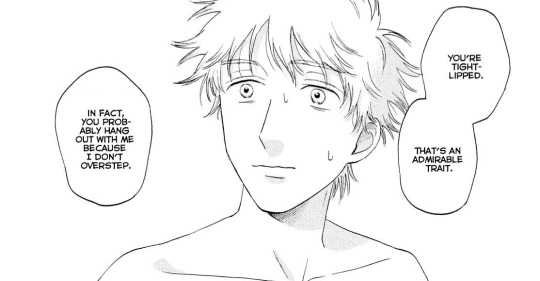

shima is just so, so lonely...
but this doesn't mean that shima's supposed to become ready to be a "boyfriend" on those terms. i just think he's still trying to figure out what all of these things mean to him. and the good thing is that mitsumi is also trying to figure out these things too. the difference between them is that mitsumi is a few steps ahead, because she already understands what friendship love feels like. and when it comes to that, she gave us one of the most special love confessions i've ever seen.
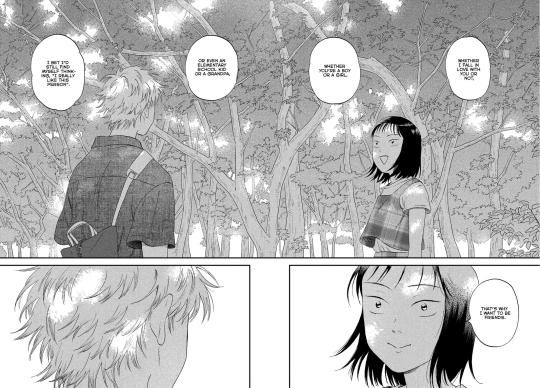
so many people talked about this scene already, but now, in the light of chapter 53, her saying "i really like this person" has a whole new meaning. this is the most honest love shima has ever received from anyone. no romantic confession could top that. no romantic feeling could heal his wounds the way these words from mitsumi can. this is a treasure shima can't afford to lose.
we're taught that romantic love will save us. that it will make us the happiest, that it completes us. we grow up believing that we can't survive without it. what we really can't survive without are our friends... skip and loafer is putting friendship above everything else, but more than that, it is questioning how romantic love is supposed to feel. some people feel it, some people don't. i think most of us don't really know what it is. we think we do because we read enough, we saw enough movies, we listened to enough love songs. i think i felt it a few number of times in my life but everytime i felt it for someone new i asked myself, was it really love before? what is it, really? if i never read those books or saw thoses movies or listened to those songs. would i recognize it? would i know it better? would it even exist?
aren't shima's feelings for mitsumi already valuable enough? big enough, true enough? would they change if he called them romantic? mitsumi has SO much to teach him about love, about himself, about others. their encounter is so beautiful and so rich. we see how much he's changing, how many new things he's finally starting to understand about himself, how many important steps he's taken since they met. is finding romance at the end really the most important thing for their story?
#skip and loafer#skip to loafer#PHEW OK ALRIGHT I DONT KNOW WHERE ALL OF TJIS CAME FROM BUT HERE IT IS#yes i do hope they get together i do want then to say i love you i do love the blushes and everything i just really#appreciate the way this theme is being approached in a non linear way#and probably it will end with them being together but not as a final goal but as a consequence of the goal which is#learning about themselves and their feelings and about relationships and frienships and growth and communication and human complexity#aaaaa#bea talks
489 notes
·
View notes
Text
i’ve been watching One Punch Man, and i do appreciate that ONE makes sure to balance class differences (in terms of status, not money) pretty evenly. a lot of class-centric stories, especially in shonen, pick one of two extremes: make all the characters high-ranking individuals with low-ranking npcs as cannon fodder, or make all the lower-ranking MCs rise to the top while high-ranking characters sneer. The first one paints the high-ranking characters as the only people worth talking about; the second one makes the low-ranking characters seem like plucky underdogs who deserve their positions more than the high-ranking ones.
but One Punch Man has a point to make about hierarchies - namely, that people can be good and bad no matter where you are in the pecking order - and unlike a lot of other shonen works, he puts his money where his mouth is. sometimes you get selfless, heroic Class S heroes (Genos, Bang), and sometimes you get selfish, arrogant Class S heroes (Metal Knight, Tornado). sometimes you get altruistic, hard-working Class A heroes (Smileman, Lightning Max) and sometimes you get self-centered, opportunistic Class A heroes (Snek, Dark Gatling). sometimes you get Class C heroes who are willing to sacrifice themselves to save others (Muman Rider, Chain Toad), and sometimes you get Class C heroes who’d rather chase after recognition and fame at the expense of other heroes (the Tank Top brothers).
and in the middle of that you have Saitama. possibly the most powerful man alive, easily the most powerful man in the Hero Association, and yet he's ultimately just a c-grade hero trying to make his way up the ranks like everyone else. he does want to earn a higher rank, but only because it's a goal to pursue (and probably because he's lonely and conflates attention/notoriety with human connection, but that's a whole other post). and yet it's been shown multiple times that even in the face of an opportunity to raise his rank, when it comes down to it, Saitama will always pick helping others over being a hero. he'll lean into ugly rumors about being a lying cheater if it helps Class B heroes get the recognition they deserve. he'll save people who insult him (Suiryu), people who are taking advantage of him (King), people who obviously deserve whatever karmic punishment he's saving them from (the butt-chinned kid). he treats everyone equally, regardless of rank or wins/losses ratio, and judges them on their own merits - not by how powerful they are or how high their rank is, but by how well they treat him and others.
One Punch Man stands out because ONE is determined to go the extra mile in showing that status simply doesn't matter to real heroes. it's not a matter of what rank you are - it literally is just how you choose to conduct yourself. you get bad apples in every bracket, but you also get real gems who defy all the negativity that builds up between ranks and genuinely try to help. you can tell ONE really thought out his deconstruction and subsequent reconstruction of the class/status divide and power scaling issues that are so prevalent in shonen manga, and as per usual with his works, it makes for a thought provoking read.
#anyway. that's enough big words for one day#i just think it's neat how ONE always says “is anyone gonna thoughtfully critique that” and doesn't wait for an answer#i've never known an artist like him#one punch man#saitama#analysis
183 notes
·
View notes
Note
Hi this is so dumb what are tankies, specifically
let me preface this by saying that this is not dumb. not asking questions when you don't understand something is dumb and i'm proud of you for being inquisitive, anon.
so in a nutshell... 'tankies'—it's slang in leftist circles for folks who get all hot and bothered for authoritarian regimes that claim to be communist, like stalin's soviet union or mao's china. these were governments that, yeah, talked a big game about socialism and the working class but ended up crushing a lot of the freedoms and rights that are pretty essential to true socialism, and definitely to anarchy.
keep in mind: the word "tankie" has absolutely nothing to do with the left-right axis, but with the authoritarian-antiauthoritarian axis.
when i, as someone who identifies as a leftist anarchist, refer to someone as a tankie, it's because they are *as left as me*, but too authoritarian to be safe for me, after a whole century of authoritarian communist regimes persecuting anarchists.
from an anarchist pov, which is all about getting rid of unjust hierarchies and giving power back to the individual, the whole tankie mindset and way of thinking is counterproductive. anarchism is about flat structures, deconstructing unjust and unfair systems, and definitely no secret police or labor camps, which were a huge part of the stalinist-era soviet and chinese maoist playbook.
supporting governments that use force and repression to control their people kinda goes against the whole ethos of fighting for a fairer, freer society. it's kind of like cheering for the underdog and then also celebrating when the underdog becomes the bully once they've got power. it trades one form of oppression for another, which is exactly what anarchists and most reasonably informed socialists wanna avoid.
it's important to understand the past to build a better future, and the history of these authoritarian regimes show that concentrated power is risky business. what starts with the promise of equality often ends up with just a new set of gods and masters. freedom and respect for individual rights are obviously vital to the anarchist viewpoint and tankies generally espouse views directly in contrast to these beliefs.
163 notes
·
View notes
Text
"i am a LEATHERFAG but these PROBLEMATIC KINKS sexualize POWER DYNAMICS AND ABUSE" ok now explain me what you like about leather. why leather. oh is it bc leather is culturally in our minds connected with dominance, even abuse of power; when you look at the movies, people who wear leather are either bdsm dommy mommies or - so famously - all those gestapo classic švabo officers. leather is, in our culture, related to power dynamics. ok so you think relating this to nazis is a stretch. who else wears leather, bikers? well bikes are powerful engines, masculine regardless of the bikers gender; in fact you could talk to fillipo tommasso marinetti about it. oh sorry, fascist this time. ok then you saw it in mommy doms and corsets. dont you think corsets are kinda problematic, considering their very purpose? ok so not dom mommies, maybe its the punk rock and rebellion. does rebellion have anything to do with power, in this way where the opressed becomes a hero?
whatever you do, whatever angle you take, leather will always be linked to power dynamics - even if you reduce it to the process of making it by skinning and killing. thats because EVERYTHING in human society is influenced by symbols and words and abstract understanding.
you can literally do this with anything, you can take silk. why do you like silk, is it because it relates to common association of luxury and gentleness? do you think luxury has anything to do with class opression? does your idea of silk come from sinophobic dreams of etheral yet submissive chinese women?
thats because our current world in 2024 lies on top of milennias of intricate hierarchies and power dynamics and abuse; you can even take vanilla sex and deconstruct it. you can take any single sexual thing and do this because we communicate in symbols and associations, and singling out "those nasty freaks" is gonna come bite you in the ass eventually
89 notes
·
View notes
Text
Deconstructing the ego
⚠️This post may seem radical, so proceed at your own discretion. It is intended for you to deconstruct your idea that you need/want things, because you don't. It's your belief in the ego, in self-imposed concepts, and ideas. Dare to deconstruct your beliefs. See what you're left with when you eliminate the desire for admiration, romance, popularity, status, etc. Your desire for specialness and separation.
⚠️I would also advice not to read this if you are someone who just wants to learn about nonduality so you can "get" your "dream life". This is not for you, for this is precisely to deconstruct such ideas.
The moment you realize that you are consciousness, not a body, do you also give yourself credit for all of your creation? Do you realize all that exists has been imagined by you? Language, concepts, history, the laws of physics, biological needs, psychology, technology, social media, society, all of it is being imagined by you. You do not give yourself such credit because you think you are the ego, you think "but I suck at math, how would I take credit for the laws of physics?" yeah, y/n did not do that, y/n is a limited being that needs to take classes in college in order to learn about physics, *you* are not y/n, you have become attached to it and think it is you, you think you need to go through its hardships and self-imposed concepts, to navigate this world. When you eliminate your belief in all of these things, what are you left with?
Imagine you want a significant other... what about a s/o makes you want one? The physical needs you think you have. The desire to be touched, hugged, kissed, because you're a human and humans need that. Support. Words of affirmation from a seeming other. Admiration from a seeming other. The aesthetic of it. The need for company?
What if I told you, you made all that up? What are you left with when you realize you don't *need* or even *want* any of that? Your ego will try to convince you otherwise, and persuade you into thinking those are basic human needs, but who came up with such concept? Who is admiring you if all there is, is consciousness and not your body nor a seeming other are real? Who is admiring who? Interesting, huh.
Now you want money and riches, it seems fun to live a lavish life. No worries at all, have a private jet and infinite amounts of money. Attending fashion shows and meeting celebrities... "celebrities" interesting concept right there, who's given your favorite celeb their status? Who came up with the status hierarchy in the first place? Imagine if you removed your belief in a hierarchy... no one can be more or less than anybody, what are you left with?
Question your beliefs y'all, some people seem to be so sad and rushed trying to get something they made up. Seriously, you imagined all of this. All of it. From the thing that you *want* to your belief that you *need* it.
To finish this post, I just want to mention there is nothing wrong with none of these things, you can have a private yet and a significant other. You can imagine y/n on a private jet with their s/o and it exists in that very moment. Just realize you are free from desires. On one point because you can't possibly lack anything, and on another point because you do not need anything. Understand? You are free, NOTHING owns you.
246 notes
·
View notes
Text
A Terribly Organized Almost-Essay About Suzanne Collins and Why I Think She Writes
Lukewarm take because it's been years, but here it goes: if there's anything I've learned over the years, it's that Suzanne Collins is not a people pleaser. (The author, at least. I don't know her personally lol). And she be pleasing the people, that's not what I mean! I just kept hearing the same question being asked over and over again. "Why Snow? Why him?? Why not anybody else? Really?? A prequel about HIM??" It really made me think.
And don't get me wrong! I'd slash someone's tires for a Finnick prequel just like the next person (Suzanne please!), but that has never been the point of her writing. The Hunger Games novels, and by extension, the prequel book The Ballad of Songbirds and Snakes, aren't just fun fiction reads. Yeah, they're gripping. The world-building is superb. Young people are at the center of it. And all these characteristics are great, but the thing that draws us in, that keeps us consuming her media like hungry little caterpillars, is that they are, time and time again, a captivating and accurate criticism, analysis, and deconstruction of the broken systems society experiences in the real world. I can only speak from my own experience as a Mexican American woman in the United States, so take all of this with a grain of salt.
The Capitol is colorful and fun and interesting and horrible and sadistic. And it is all those things because it is a symbol of our own real-world 1%, except our own glittering Capitol members here in the real world feed us the hope that we may reach their status if we only work hard enough for long enough. The Hunger Games system never makes that claim. In fact, they are fed the narrative that the system only works because they're stuck where they are. Suzanne Collins is taking everything one step further in her writing because it is a type of satire, a critique of the things we already know. So as an author, she blows it out of proportion so that her reader will say "look at this! How ridiculous! How would someone let the system treat them this way!" And it is ridiculous, it's downright laughable that an entire society, an entire country, would let itself be oppressed in such a cruel way by just a few people in charge instead of rising up and- oh wow, yeah, I see it. She wrote about us.
Suzanne Collins just organized everything neatly into boxes- well, districts. Because every district comes with some form of product that they manufacture, but much more importantly: a class. We go in order from 1-13. District 1 manufactures luxury items and District 2 makes weapons (but mostly trains Peacekeepers), so they have the most privilege and wealth. On the other end, Districts 11 and 12 are the agricultural and coal mining districts, respectively. That's back-breaking work. Not to mention District 11 puts kids as young as 12 to work, and District 12 is poverty-stricken and starving. "But what about District 13?" You may ask, "They make nuclear weapons! Why aren't they up there with 2?" Fantastic question. If we know, and the people of Panem know, that the hierarchy is very clearly set by literal number order, why would one of the most powerful and competent districts be given more power and be put at the top? Placing them at the end lets them believe that they aren't powerful or competent. I mean, jeez, look at 12 and they're before 13? I wouldn't believe I could make it on my own either. (We know now that's not how things go down, but it's a clever power move regardless.)
But after all this, would it hurt Suzanne to give us a single book just for fun?
Yes, I believe it would, that's the whole point. We're not meant to fall for the Peeta/Katniss/Gale love triangle. We're not meant to be interested in Finnick's secrets and early life. We're not meant to want to know the morbid details of how Haymitch won his Games (with double the contestants! Ooh. Aah.) We're meant to be horrified at every turn, at every story. We're meant to ask ourselves how things got so bad, how anyone let this happen. Suzanne Collins has written wonderfully fleshed out characters that grip us and make us want to know more, but the point has never been them or even their loved ones. It was never about Katniss or Prim or Peeta or Finnick or Annie. It's always been about the systems that let this story happen, and where Suzanne got her inspiration: the very real lives we lead. The Ballad of Songbirds and Snakes shows us the same thing.
So why Coriolanus Snow? Because he is the catalyst to a broken system that only serves the powerful. If Suzanne were to write a novel about any of our much more beloved characters, then she would be writing the exact same book over and over about the same oppression happening in the same system. She does not write for the sake of bringing her very well-written characters to life, but to flesh out the poverty, the starvation, the power struggles, the horrors they experience. We know this because she writes a lot of her characters as symbols. (Coin, for instance, as the symbol for a power-hungry figurehead, or Prim as the innocent during war.)
Snow is living in a slightly different biome than what we know from The Hunger Games series. He has to make sacrifices and decisions for him and his family, but it's different. It is a view and critique from the inside looking in. This is not Katniss getting to experience the Capitol for the first time and understanding just how terribly unfair everything is. This is someone who is very aware of the way things work and playing the game to stay in power and keep their privilege. Not only that, but it's someone who feels entitled to all of it. In this novel, Suzanne plays around with power and people's position in it. What if a mad scientist was in charge? What if the creator of the thing that brought a semblance of peace was just as horrified as the reader? How far is one person willing to go for power? What if we saw the dawn of a world we're already familiar with?
So I hope she keeps writing, because I love seeing our world through her eyes and the parallels she writes from our world to hers of the injustices happening every day. Even though we'll probably never get the stories we crave, but that's okay. Keep putting those kids through hell, Suzanne.
#tbosas#The Ballad of Songbirds and Snakes#books#The Hunger Games#Suzanne Collins#reading#author#essay#spoilers#THG#tbosas spoilers#thg spoilers#i didnt have a great ending or conclusion for this my bad#i just have a lot of thoughts#finnick odair#peeta mellark#katniss everdeen#primrose everdeen#coriolanus snow#president snow#district 12#catching fire#dangerouslypassiveaggressive
61 notes
·
View notes
Text
All of our institutions have been built upon the assumption of ego and dominance hierarchies, and deconstructing that is really what the future is all about.
Terence McKenna

111 notes
·
View notes
Text
A Look In The Mirror
She-Ra and the Princesses of Power exists in cycles and spirals, that's part of why I call it an tragedy trying desperately to happen. A ton of the tension is driven by the question of whether or not the characters will break out of the cycle. In other words, the story is about agency vs fate (a bit like Romeo and Juliet, I wonder what else the two have in common).
There are many ways to get across this theme, perhaps with carefully laid parallels and nuanced storytelling, both of which She-Ra does. But Signals takes a different, far less subtle approach. The episode tells the audience overtly what the series as a whole is about, and what exactly can subvert it.
Let me explain.
SPOILERS AHEAD: (She-Ra and the Princesses of Power, God Of War: 2018, God Of War: Ragnarök)
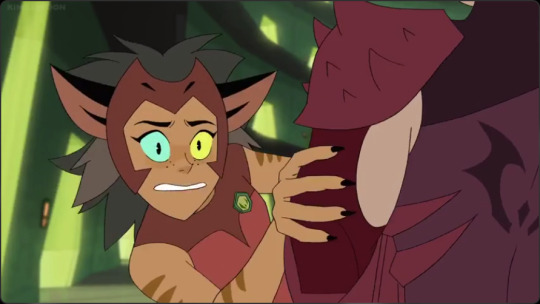
Signals opens after Entrapta's loyalties become general knowledge, and I would like to start with Bow's story in this episode, because it is a microcosm of how the story works as a whole. A vacancy is opened in a hierarchy and the new appointee tries to do things the way that their predecessor did. People become caricatures of those they see as powerful in their designated area and have to learn that being themself is just as useful, if not more so.
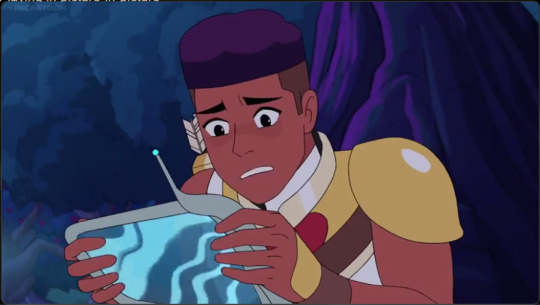
Bow, for example, seems convinced that failure is to be avoided or hidden. He has to be perfect, and able to fix anything. But, as Entrapta herself explains:
"There’s no reason to get huffy because an experiment fails. Failure is a vital part of scientific endeavor."
For all of her eccentricities, Entrapta is one of the wisest characters in the series, with only Razz outdoing her in that regard. (Swiftwind comes close). To that end, this is rather decent life advice, sometimes the best way to learn is to get something wrong and experience the consequences for that, instead of being either protected from consequence, or being punished for trying.
Hold on to this thought.
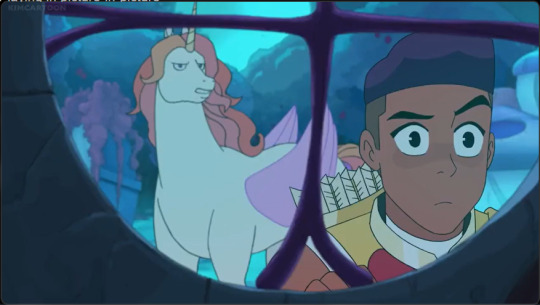
In essence, Bow is a relatively simple character by nature, he is necessary to balance out the entirety of the rest of the cast. But the word "relatively" is doing a lot of heavy lifting there, because Bow is nuanced, specifically in his relationship with obstacles.
Bow begins with a very simple worldview, but Entrapta single handedly complicates this time and time again. With her death, her allegiance, and her legacy. Bow realises that his worldview needs nuance when his top down perspective gets someone "killed", then he realises that his idea of binary morality is skewed when Entrapta defects, and here he learns about failure and tactics by trying to live up to her image.

Bow remains simple, in contrast with the theme park character development of Catra, Adora, and Glimmer, but he does learn and adapt.
So, Bow sets the baseline, to break from the cycle, you need to change. You need to stop trying to be someone else, and instead focus on being the best you that you can possibly be.

God Of War: 2018 and its sequel use the analogy of fate to describe this principle. Thor becomes an absent father because of his own father's abuse, which then leads to Magni and Modi being schmucks as the cycle continures. Odin explicitly gets to see what his future holds and ends up inadvertently causing it to come true in his attempts to subvert his fate.
Fatbrett on YouTube has a video titled Odin - A Deconstruction of Villainy that delves into the character as a whole, but I would like to zero in on Odin's core flaw and the message of the game as a whole. To change your fate is to change your nature. Odin is incapable of change, so the prophecy comes true.
But Kratos and Atreus do change, but their journey is towards learning to not avoid being themselves. Kratos' journey in God of War: 2018 is directly caused by not telling his son about his past, and Atreus spends the entirety of God of War: Ragnarök trying to be either his father, or Odin. The message of the story is this:
"Don't be sorry, be better"
Learn from your mistakes.

Adora takes this in an interesting direction, because it's genuinely difficult to see her as having much meaningful character development in series one at all, and I actually think this is a good thing. Because on a surface level, Adora goes from bad guy to good guy and escapes from an abusive relationship. But does she? The only thing that happens to the parental relationship is a pallet swap.
All Adora does in season one is change her surroundings, but the key part of that is her foundation. Adora spends season one surrounding herself with people who will enable that character development to flourish and not be broken down... and Light Hope. In season two, Adora starts making strides towards actual agency, and that is all because of the setup she has been doing.
I have gone into Depth as to how Light Hope is a bad influence in other posts, but this episode hammers home just how easily Adora internalises things. She keeps Shadow Weaver's tales of the Weeping, Headless, and Undead Princesses in her mind, for example, absorbed uncritically.
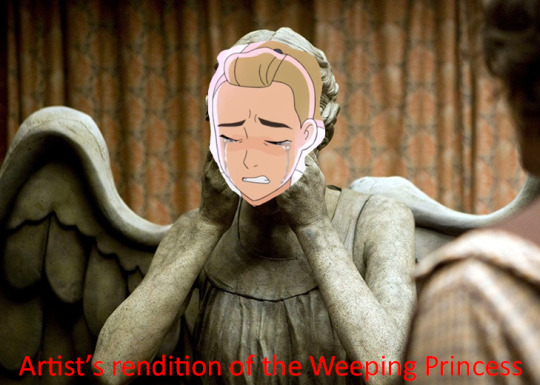
But Adora also keeps the obsessive blaming. She sees a problem and immediately attributes the cause of it to the Horde, a holdover from her time there, where she had the same attitude towards Princesses. In this instance, she's wrong, and the problem is more nuanced, and her assumptions get the better of her.

Speaking of assumptions, the first ones make an appearance in this episode, kind of. The messages that they leave behind give a glimpse into their lives that we haven't come close to getting before.
"I’ve been thinking of them as these big epic figures. But they’re regular people, sending messages to their loved ones."
The theme of cycles and living up to legacies continues with the worldbuilding of this story. Modern Etheria tends to visualise the First Ones as great and powerful and perfect, but they were just as human as the rest of the characters. Once again, those trying to mimic their predecessors exactly come up short.
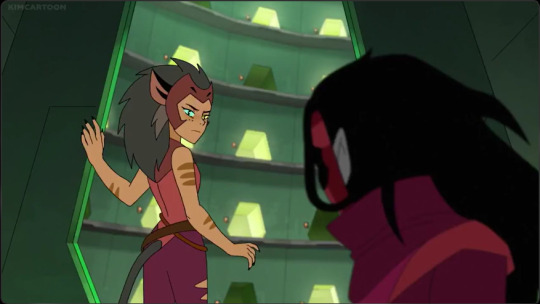
Over on the Horde side, Catra is going through a similar situation, she is trying to become Shadow Weaver, but coming up short because there was more the story than she realised. Shadow Weaver had to do paperwork, for example.
There's also the fact that she is still in the abusive environment. She still regularly visits Shadow Weaver, so the psychological bullying still happens, but she's also around Hordak, now. I said that Adora has just pallet swapped her situation, and I think Catra has done the same.
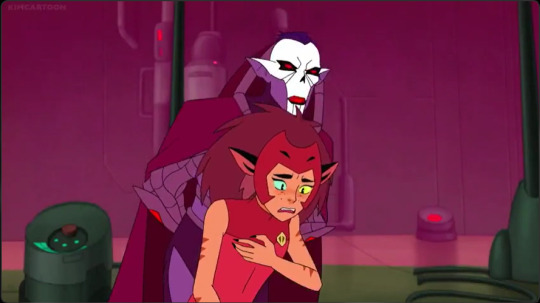
When Hordak takes the atmosphere out of the room, it is awful, and it's the moment in which Catra should realise that it doesn't matter how high up in the chain of command she goes, she will still be suffering. She should realise that she needs to get out of there for her own safety and sanity.
But she doesn't realise that. Instead, she applies what she has learned in her upbringing. She is convinced that all she has to do is succeed, and she will get that attention and fairness. Conditional acceptance is what she is used to, so she doesn't see anything out of the ordinary here.
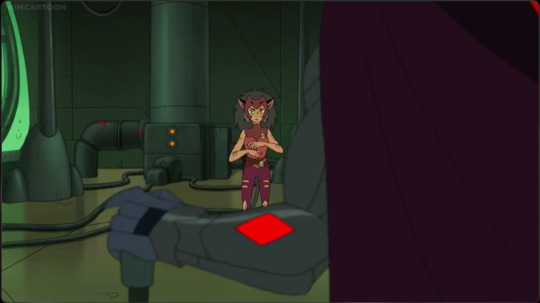
"Failure is when something ceases to serve a purpose. When that happens, it becomes worthless to me."
This is Hordak's worldview, and I hate to argue with a villain, but I think he's wrong there. If success is usefulness, and everything will eventually stop being useful to you, then you have a pretty sad life. If you judge everything by utility and don't care for relationships or things that just look and feel nice, then you are alone.
But on a broader, purely utilitarian perspective, this idea is bunk by that standard too. Failure as worthlessness is an objectively false idea, because mistakes are things to learn from. If something doesn't work, try again differently.
In other words:
"Failure is a vital part of scientific endeavor."
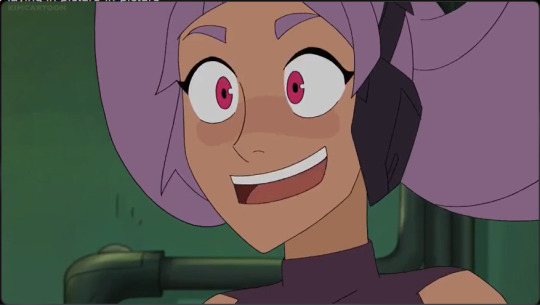
Entrapta is back, and this episode actually gives a glimpse into how to subvert the cycles, specifically through Entrapta and Hordak.
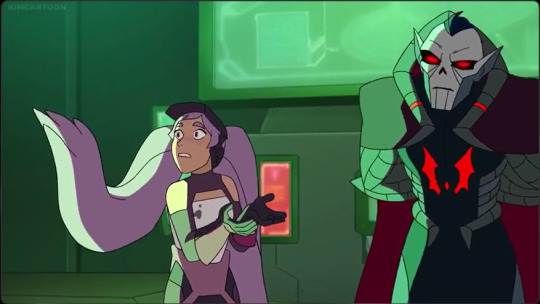
Firstly, Hordak has evidently been trying the experiment over and over again without learning anything. So Entrapta, by nature of her ability to adapt, makes the experiment work. It's a tiny metaphor for what I've been saying so far.
But Entrapta breaks through Hordak's barriers because of her sense of freedom. The best way to break free of a downward spiral is to start moving in a different direction, and Entrapta does that easily. The reason she so easily switches sides is because she isn't tied down by anything (not even morality). She can't even be imprisoned because she is impossible to contain. Entrapta is a free spirit, and I think that that is what the series is about, personal agency.
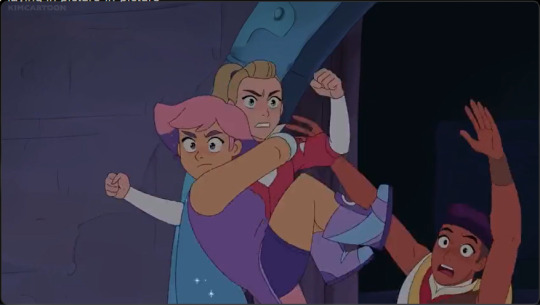
Catra and Adora are repeating the same story over and over again because they think they have no choice, that's what the tragedy of the series is, the two main characters are on a road to destruction and can't change direction. But the story isn't a tragedy, it avoids being one at the last possible moment when the characters finally realise that they have agency, and that thematic is foreshadowed right here, in Signals.
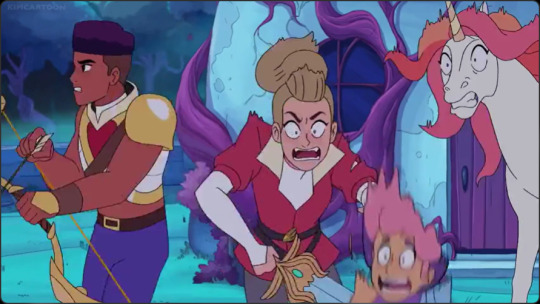
Final Thoughts
In my plan for this post, I wanted to bring up the Darksouls series, of all things, but I think I will save that idea for a later episode.
In any case, this episode manages to discuss some overarching philosophy, as well as explicitly state that this has happened before, this is a story about repetition, learn from your mistakes.
Also, the cinematography in this episode is really cool. It flies under the radar a lot, but the camera placement and movement really heighten the tension and vibe of this episode.
Next week, I will be talking about Roll With It, an episode that is near and dear to my heart for completely unbiased reasons. Definitely unbiased. Not bias there at all. So, stick around if that interests you.
Previous - Next
#rants#literary analysis#literature analysis#character analysis#what's so special about...?#she ra and the princesses of power#spop adora#spop#she ra#spop entrapta#spop bow#spop hordak#she ra catra#she ra spop#she ra adora#she ra bow#she ra entrapta#she ra princess of power#catra#adora#mermista can do no wrong
36 notes
·
View notes
Note
hello !!
i was wondering, do you know any other characters like aang from other shows/movies/books? or maybe, just his theme of radical kindness appearing in other stories?
i've been missing aang, and it would be nice to find other representations of such a fun and warm personality like his.
ps.: your blog is like, fantastic. truly.
🥰🥰🥰🥰 This is the best ask I’ve ever received!!! Depictions of radical kindness in media is a special interest of mine—not exaggerating. So I’ve done my best to make a list of rec’s, just tv, from most formally similar to ATLA to least, with a short description for each.
1. Fruits Basket (2019)
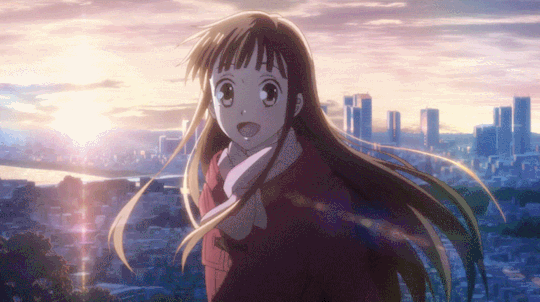
"My mom told me, it's better to trust people than to doubt them. She said that people aren't born with kind hearts. When we're born, all we have are desires for food and material things. Selfish instincts, I guess. But she said that kindness is something that grows inside of each person's body, but it's up to us to nurture that kindness in our hearts. That's why kindness is different for every person."
An anime orphan whose established memory of the kindness by which her family raised her ends up transforming and liberating a whole clan from an intergenerational curse that enforced an abusive hierarchy all within a show that has a deeply queer subtext, beautifully complex plotting and character development that due to its zen influence refuses to demonize anyone or any perspective wholly, AND a straight romance you can actually root for!? Nothing comes closer to ATLA thematically than this show. While the lead Tohru Honda is the biggest representative of radical kindness, the character of Momiji Sohma with his complex purity, idealism, and gender performance is one of the closest you'll find to Aang in any media.
2. Mob Psycho 100 (2016-2023)

"The truth behind one's charm is kindness. Just be a good person, that's all."
Mob Psycho 100 explores a core tenant of ATLA's critique of imperialism and power: greatness and perfection are overrated. They both ask the question about what to do for the world with one's gifts if that's the case. How can one be both normal and prodigious at the same time? The satirical comedy and style of this anime, which deconstruct a lot of the shonen genre tropes, are pretty distinct from ATLA, but when ATLA arrived on the airwaves, it was a pretty massive break from tradition in Western animation, and for both of these series, that difference of style is tied to the message of the show about the experience and acceptance of difference.
3. Natsume's Book of Friends (2012-present)

"As I encountered kindness, I wanted to be kind myself."
The anime, Natsume's Book of Friends and ATLA both depict the challenge and necessity of facing abandonment, loss, and a deep-seated loneliness with kindness and gratitude despite the persistence of grief. Both take a deeply spiritual view--even a responsibility--of this experience that demands a compassion for all beings including those who intend to do harm. Natsume, an orphan shuffled between houses who is one of the few people who can see spirits called youkai, inherits his maligned grandmother's book of yokai names, becoming a target for them in the process. He hides all of this from everyone in his life, and even five season in, still has trouble admitting to the one person who understands him when he is struggling and needs help. The gentle and light tone papers over a profoundly honest representation of attachment trauma and the wisdom of compassion that develops as a tool to cope with it.
4. Hunter x Hunter (2011-2014)
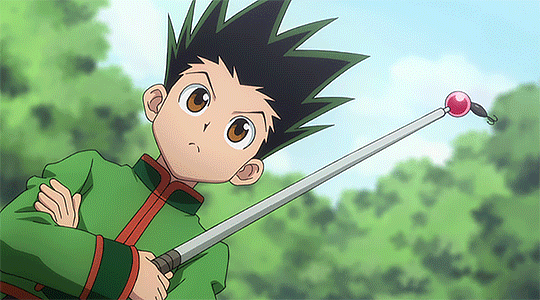
"You can do whatever you want to hide your feeling. You still have a heart."
If you think that "Radical Kindness" is by definition non-violent, then this show is either not for you or going to change your mind. Gon, the protagonist of HxH, like Momiji mentioned in Fruits Basket, is another rare character whose naivete and optimism are treated with respect. He is allowed to suffer, to be wrong, to be stupid, and to inspire others away from their own cynicism with the persistence of his beliefs nevertheless. But HxH is a show that integrates the most violent aspects of the world (organized crime, capitalistic competition and privileging, state-sanctioned brutality, pure sadism) with its examination of human potential for goodness. And even within a list of shows deeply inspired by spirituality and religions, this show is abundant with religious references as it seeks out meaning, balance, and an ethic for modern experience. On top of that, it ranks with ATLA for the depth and relevance of its magic system to its themes, plus its got gay subtext out the wazoo!
5. Mushishi (2005-2014)

“Make sure to remember, every person and place has a right to exist. It is true for you too, the entire world, as a whole, is your home."
Elegaic, episodic, compassionate, and strange, with some of the best short story-telling of all time, Mushishi is the story of a medicine-man who travels the Japanese countryside helping people deal with the spirits that accompany the little trials and tragedies of life that cling to our minds long after they're passed. The protagonist, Gingko, and the show itself takes the approach of restraint to observe these problems fully and come to a conclusion that's taoist in its balance and acceptance of reality--"Eyes unclouded by hate" as Miyazaki/Gaiman would have it. Each episode is like a therapy session arguing for you to choose to live even as the heaviest burdens sit on your chest.
6. Reservation Dogs (2021-2023)
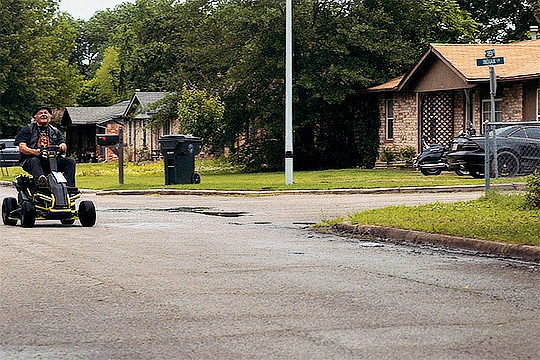
"See...love doesn't have to be received, it can just be."
We're finally out of the animes, and moving away from the zen and shinto approach into some other options. Reservation Dogs' indigenous humanism was groundbreaking, bringing in distinctly modern American realities (with the kind of true-to-life details only a an on-location shoot could offer) with Native beliefs about ancestry, community, and connection to the land, while rarely feeling preachy. Instead, it's just fucking hilarious and casually heartbreaking. Four friends on the edge of graduating high school on a reservation in Oklahoma try to figure out what to do with their lives after their plans to go to California get abruptly messed up. Radical kindness as a concept often gets focused on accepting the enemy but what about accepting the weird stoner uncle who farts all the time and won't talk about his years in the army. I think that might be a more important goal of radical kindness, in truth, if we are being asked to look and accept reality for what it is, because growing comfortable with disappointment and the mundane let's us live without the relentless striving that drives perfectionism.
7. Skam (2015-2017)
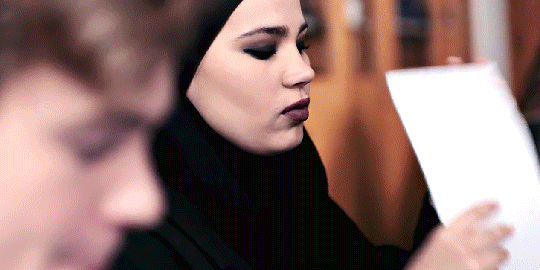
"The second you start looking for hate, you find it. And when you find hate, you start hating."
A Norwegian teen drama that understood internet culture better than any show before or since, four season-long romance plots better than any romance film from that decade, and a masterfully constructed exhortation about leaning into failures of connection to build deeper compassion rather than demonize another person or group. Each season focused on a specific character within a high-school friend group, emphasizing the limited scope of subjective experience, and had them confront the challenges of opening up to others fully. And even when they return into the scenes with new protagonists, their lives weren't sorted perfectly, reflecting how resolving a single romantic plot point would not resolve life. The impact of this low-budget public-television web series (!!!) will be felt for years (it's already been referenced by Netflix juggernauts like Sex Education and Young Royals), but we're not likely to see something that juggles political themes, heartfelt characterization, realistic dialogue, and meta-commentary (it flashed its own hater and fan comments across the screen in the last episode!!) in such a obsession-inducing package anytime soon.
7. Boys Like Boys (2023)
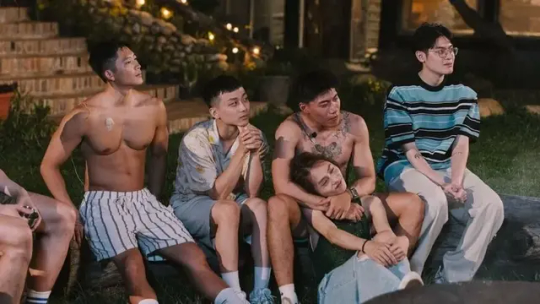
"Because I have always been someone who hates myself, I don't have the courage to face it. Running away is my only option...What if I give myself one more chance to be brave?"
So how can a reality show make it onto a list of radically kind tv series, especially a dating show!? Well, when that reality dating show casts people who radiate warmth, vulnerability, and respect and seem to have the kind of chemistry that most scripted shows can't even manage, it's a good start. But then, when they elevate that cast with a format that addresses the cruelty of dating, elimination formats, and broader societal exclusion (an important consideration for a gay dating show), it offers a new model for future shows. Boys Like Boys did this when mid-season (spoiler alert) they had contestants vote out a contestant, only to provide the contestants with a vote in which they could retain a contestant who they didn't want to leave. In fact, many of the contestants asked if they could abstain from making a vote that would eliminate a constestant and were allowed to. The final result left one contestant, Jia-Hang, up for elimination--he had voted for himself to be eliminated, and many contestants, recognizing his reticence to continue on the program, didn't want to force him against his will to stay. Then, looking around at nearly the whole cast sobbing, even apologizing to him for not providing him enough support, Jia-Hang chooses to stay on. This is just one of many heart-warming authentic moments in the show that illustrate the vital influence of kindness to impact the trajectory of our hearts.
8. Joe Pera Talks With You (2018-2021)
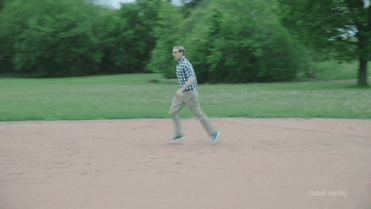
"I can help you reach things. I can tend the garden. The different hours we keep are a good thing. And when they overlap, I can offer companionship and entertainment."
So much has been written about this show's groundbreaking kind approach, I'm going to quote instead: "It can be difficult to convey how a TV show airing on Cartoon Network’s provocative nighttime programming block Adult Swim can evoke almost nostalgic feelings of kind-heartedness. The premise of Joe Pera Talks With You is so simple as to almost be beside the point: Comedian Joe Pera plays a lightly fictionalized version of himself as a sweet Michigander, a middle-school chorus teacher with small and specific passions. Joe likes breakfast food, obscure trivia, beans, trips to the grocery store, and his grandma. He greets every day with a contented smile, stands beneath a pale blue sky, packs a balanced lunch that contains no surprises. (A turkey sandwich with cheese and a tomato, a banana, some trail mix, and as a treat, some cookies.) Joe, more than anything, is satisfied. His greatest joy is sharing these small pleasures with you, the viewer who exists on the other side of the fourth wall he has cleanly dismantled, often speaking quietly to the camera like he’s sharing a secret, just between you two. That he’s talking “with” and not “to” you is a crucial distinction in the show’s title: Joe never lectures nor rhapsodizes. Instead, he waxes poetic about what he loves and who he cares for and how he leads his life, telling his stories from a vulnerable position of welcoming you into his daily existence.” --“A Great Comedy About Being Good,” Allegra Frank for Vox
9. Anne with an E (2017-2019)

"Her life was not short on challenges, and still she held no grudges, believing instead that grace is perennial like the green, green grass."
While maligned for not being the 1980s version, this Netflix adaptation of Anne of Green Gables takes what many have read as an autistic subtext and made it text, giving Anne a performative quality that pushes a lot of the audience into the same irritation that the characters of Avonlea feel for Anne at first, and, thus, requires its audience to persevere toward the same kindness that Anne inspires in her adoptive mother figure, Marilla, among others, which is much more rewarding than simply identifying with Anne right away. In so doing, it enhances the development of its broader approach to acceptance--an approach in its insistence on the requirement of a community of kindredness (see Sebastian's excitement at finding out about the black community in "The Bog") that is much more rigorous than many other shows will cop to. Expanding far beyond literal adaptation into queer, black, and indigenous characters, without disguising history or disparaging the thematic seed of grace at the heart of the novels, Anne with an E imagines what it meant and what it might still mean to build real joyful community with others through kindness.
10. Little Bear (1995-2003)

"Interesting."
A childhood favorite that disguised in its simplicity a wide-openness to the world and an acceptance of different natures. While most child shows emphasize kindness, few do so with as much patience, wonder, and generosity extended to its viewers. Little Bear is a curious kid who goes on adventures in the woods around his house that can turn into games or small imagined experiences. He is sometimes with his friends Cat, Duck, Hen, Owl, and Emily, whose personalities, along with Little Bear's, bring about small tensions in their games that ultimately resolve, if not independently, then with the help of Mother Bear or Father Bear, who give each other knowing glances about the expected childhood behaviors. This is the first show that initially taught me to observe things while withholding my judgment, that first step of radical kindness.
12. The Andy Griffith Show (1960-1968)
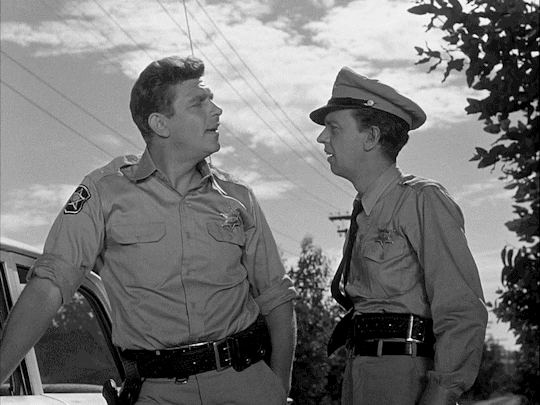
"The key to happiness is finding joy in the simple things."
One really old and somewhat controversial throwback for my last entry. If you have concerns about a sheriff character representing radical kindness, I would encourage you to start with the third episode of season 3 where Andy, the sheriff in question, has to explain to the new mayor why he doesn't carry a gun and lets prisoners go to gather their crops. There have been some fantastic pieces written about the complexities of this show's bucolic fantasy and Southerners (of all races) attachment to it, but they all acknowledge a type of humanistic and deceptively simple virtue found in Mayberry that audiences long to witness, if not emulate themselves. It's a morality that resists the "hyperactive zealotry" and bureaucracy that the show satirizes through Barney Fife (along with guest characters like the new mayor) and instead emphasizes the understanding that one can have for each individual and the trickstery middle paths that one can find to address conflict.
#sorry this took so long to respond to!#honorable mentions include Hey Arnold! & The Good Place & Friday Night Lights & S1 of Ted Lasso (but only S1 lol)#atla#kindness prevails#likealittleheartbreat recommends#fruits basket#mushishi#natsume yuujinchou#hxh#andy griffith#joe pera talks with you#reservation dogs#little bear#skam#awae#boys like boys#mp100
23 notes
·
View notes
Text

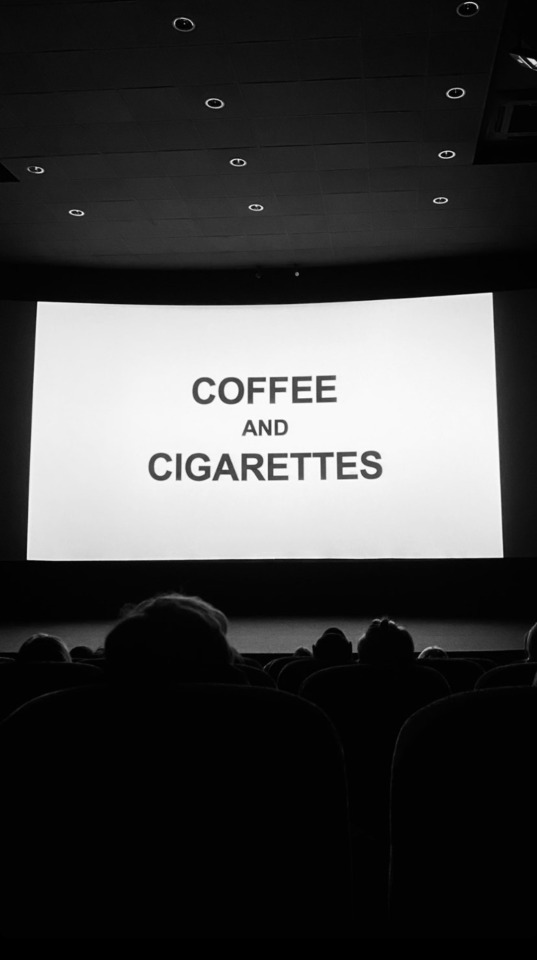
the second sex ; simone de beauvoir | part one
‘the second sex’ is a treatise on female autonomy. widely regarded as the blueprint for the second wave of feminism, this 900-page body of theory remains one of the most influential texts for women all over the globe. its impact is infinite, and beauvoir’s theory is masterfully cogent.
there’s a lot in here to reflect on and absorb. i’ve been tackling this absolute brick of a book by consuming 10 pages a day and allowing myself to really ruminate and sit with what beauvoir is putting out there. taking this book in small increments was definitely the way to go
simone de beauvoir begins by grappling with the question, ‘what is a woman?’ - an impossible question. woman is an ideal. a social reality and confinement the man constructs that pitches women in opposition to him as “the other”. womanhood is the condition in which a woman finds herself confirming a regulated hierarchy. however, beauvoir begins by answering this question through the biological. woman is a ‘womb, an ovary’. man reduces women to nature; they are mothers and reproductive catalysts. like the spider, she castrates and cannibalises; she consumes and eats men. beauvoir deconstructs the biological and the ways in which man has attributed inferiority to the natural biological difference between sexes.
biology, however, is not the foundation for womanhood. although it informs feminine existence, it isn’t the basis of gendered alterity and power disparity. beauvoir acknowledges biological subjugation while simultaneously stating that it is not reason enough for why women are the Other.
the question of ‘what is a woman?’ morphs into ‘what has humanity made of the human female?’ we must examine woman as a complete body, not in parts.
the concept of woman is examined from various schools of thought. from psychoanalysis - which is quickly proven insufficient due to freud’s misogynistic and male-oriented examination of sexual development, which is then generalised to women - to historical materialism and the role that economic value plays in female existence. beauvoir discusses engels - though classism is deeply connected to the disparity between sexes, it is not the origin of patriarchal oppression. female subordination pre-exists class divides. where the proletariat desires to erase class divisions, women do not want to be erased. we simply want to be registered in all forms. although the abolition of private property and class divisions is desirable, it will not ensure female liberation. and so, engels and marxism fail women.
this leads to a deconstruction of human history and the ways in which women were sacrificed on man’s journey for fulfilment and nourishment. as man went to hunt and build tools, women were frequently resigned to motherhood. as man conquer the world, women are left to watch from the sidelines. by dominating nature, man triumphs over woman. women become possessions like land. he is order and accomplishment; she is mystery and chaos.
as the socio-political landscape alters, the female condition continues to deteriorate. women face extreme abuse within the workforce, all for minuscule pay (and gender wage gaps DO still exist). this worsens with religion. simone de beauvoir delves into an array of theological beliefs - christianity, islam, and judaism being central focuses - and highlights the ways that each religion fails women. she also accounts for various cultural practises across the globe (from india to the mediterranean). this is very much a body of text that registers various different cultures and the nuances of each, respectively. i wish it reflected more on the nuances of non-white women’s existence within the western world, however.
i’ll end today’s overview with the most impactful line from this section for me - ‘women’s entire history has been written by men’. the problem of women has always been the problem of men. ‘it is not women’s inferiority that has determined their historical insignificance: it is their historical insignificance that has doomed them to inferiority’.
with man lies the onus for female suffering.
#the second sex#simone de beauvoir#reading update#literature aesthetics#books#book#bookish#bookblr#bookworm#bookstagram#dark academia#booklover#books and libraries#studyblr#study space#academia#study hard#study#movie#film#coffee and cigarettes#annotations#annotated books#cinema#beige#minimalism#feminist theory#feminism#studying#essay
73 notes
·
View notes
Note
Is Elijah actually a feminist? Because he said so but his actions..

Elijah Mikaelson is what we would call a "second wave feminist" or a "white feminist." While I don't necessarily subscribe to the ideas of "waves" of feminism, I think it simplifies it enough for this discourse.
Elijah is a feminist in the most basic sense of the term, in the way he believes women can be equal to men and encourages it. However, he does not actively work to dismantle the patriarchy. He is one of those cases where he likely was progressive at one point, however, society has long since progressed past him.
Dealing with the basic understanding of feminism which is basically just believing women can be equal to men, sure Elijah is a feminist. Elijah has always admired strong, independent women, even in societies where that would not be the norm.
I know some people argue that he is not because of his treatment of Katherine, but I would disagree with that. While I do not like that he was willing to sacrifice a young woman for his brother, it wasn't based on her being a woman. You can argue that he should have offered her more protection at that time because of the power dynamic between them, but again, most of the power dynamic came from Katerina being human. It would have played out similarly if the doppelgangers had been men.
I would also add that he seems to be the only one who supports Rebekah's dreams throughout the show and doesn't make sexist comments about her love life. (I'm looking at Kol and Klaus)
By the 21st Century, when the show takes place, thinking women should be able to learn to defend themselves and be equal to men is not enough. He says he is a devout feminist and then follows it up with a decidedly sexist comment. While I do understand this is the joke, it is still a thought he had and then said aloud while acknowledging it is sexist. I believe this is the only blatantly sexist comment he's made, but correct me if I'm wrong.
I wouldn't consider any of the men in this show to be true feminists for modern times. I don't think the writers even understand what that means.
This current wave of feminism focuses on intersectionality and the deconstruction of the hierarchy that has served to oppress women, the patriarchy. The quote from Enola Holmes really sums it up for me.

Elijah, and the rest of the vampires in the show, have the time, money, power, and privilege to affect real change in society, however, none of them do. Instead, they rather throw parties and blow their money, letting life around them happen. Because why change a system that is working for you?
I wouldn't expect any character in the show to understand intersectionality as the writers of the show often express classist and racist ideas/stereotypes. We see Elijah with a woman of color on a plantation that we know people are being enslaved on. Again, all of these vampires lived through times of slavery and none of them lifted a finger to try and end a system of oppression.
So it is not surprising that none of the men in the show lift a finger to help women's rights. We hear Rebekah mention it, but it is quickly followed up by a sexist comment. This is a theme throughout the show with the female characters, they are often judgemental and cruel to each other using terms that are definitely not feminist. But I digress.
Elijah seems to subscribe to the idea of feminism that if a woman can do what a man can do, she should be able to climb to the top of the patriarchy. As we now know, this is not enough. Letting women get involved in the patriarchy doesn't solve anything. It is a system that oppresses all people and needs to be dismantled rather than allowing women to join it.
We see Elijah throughout the show respect many different types of women which shows his ability to grow as a feminist. However, again, his lack of a deeper understanding of how race, class, privilege, etc. play roles in feminism continued to hinder him. We mostly see this in Elijah's more classist view of the world. Elijah is known for being condescending to others, although I do feel like it was mostly reserved for men.
I believe Elijah would be accepting of the LGBTQ+ community but that could just be head-canon.
So while Elijah doesn't do too much that is blatantly sexist, I would not classify him as a feminist by today's standards. I think he would be willing to learn if there was a character in the show that could actually educate anyone on feminism. But first, someone needs to educate the writers. (Which is a plug for my fic because, don't worry, Astra will not let that stand)
#elijah mikealson#feminism#as a devout feminist#tvdu#the originals#tvd#the mikaelsons#the vampire diaries#anon ask
43 notes
·
View notes
Text
‘There is no ethical consumption under capitalism’. This is sometimes invoked to dismiss the vegan ‘lifestyle’ as futile. What are your thoughts?
Ah, the rallying cry of people who don’t want to think critically about their own participation in a violent system. This is rhetorical violence at its finest. We exist within capitalism as both victimizer and victim. And we have to make choices every single day about the extent to which we perpetuate violence to one another.
Do you personally have the tools to eat a plant-based diet at all times? Maybe, maybe not. But do you believe in animal liberation, or do you mock it? Can you adjust your attitude to be inclusive of vegans/ism where you are able? Those are the real questions. Because I’m guessing by most people’s relentless, vicious antagonism toward animals and vegans, the answer is secretly that we hate other animals. But if that’s the case, own it. Own the fact that liberation is not your goal, but a better position on the hierarchy. And own the fact that you don’t want to deconstruct white supremacy and systemic oppression. You want it to work better for you and yours.
About media theory, tokenism and total liberation. Interview with Christopher Sebastian by Trudi Bruges of CripHumAnimal
259 notes
·
View notes